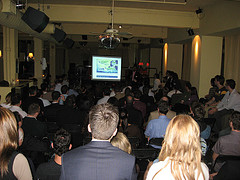 Counselors Academy Steve Cody conducted an interactive one-on-one conversation with Julia Hood, Editor-in-Chief of PR Week.
Counselors Academy Steve Cody conducted an interactive one-on-one conversation with Julia Hood, Editor-in-Chief of PR Week.
Cody led off the conversation by noting that the membership of Counselors Academy is predominantly small and mid-size agencies and that these firms have a sense that “PR Week seems to give inordinate attention to the large agencies.”
“The large firms have larger marketing budgets, more staff, huge global clients and better opportunities to get our attention,” Hood responded. However, she added, “We pay an inordinate amount of time trying to cover medium sized agencies.”
On the question of how she believes PR agencies are doing in relation to advertising in getting the seat at the executive table, Hood had a positive message, seeing PR, “Definitely making strides. The thought leadership that is coming out of the PR world is definitely resonating, especially with CMOs (Chief Marketing Officers). … More and more, you can see advertising agencies understanding this. Advertising agencies are bringing PR agencies in earlier and earlier. That shows that advertising agencies realize that they are not doing the total job. …. For PR, this is the moment.”
The most animated discussion revolved around PR Week’s treatment of the ethical controversies in which major agencies have become embroiled.
Speaking directly to the overbilling scandal involving Fleishman Hillard’s Los Angeles office, Hood initially suggested that, “No agency leader can say, ‘It can never happen to me.’ So I don’t sense a lot of glee coming out of the industry at Fleishman’s expense on this.”
She was challenged aggressively on this position by questions from the audience. One questioner asked, “Where is the institutional control? the tone of the coverage has been allowing them to get away with it.”
To this, Hood responded, “I think we’ve been pretty unflinching about Fleishman’s responsibility. Fleishman, at the end of the day, was not on trial. I don’t think we let Fleishman off easy. There were times when I wasn’t talking to anyone at Fleishman. At times I felt we had a reasonable point of view and they thought we didn’t.”
This answer elicited follow up question, “Have agencies cut you off?” Hood seemed nonplussed at this question and after some hesitation answered that, “I sat with a senior Fleishman person one time and they were not very happy. But we got through it. For myself, I take this responsibility very seriously. Communicate your displeasure, but don’t abandon the normal rules of dialogue.”
Question: “Who is responsible.”
Hood: “The individual is ultimately responsible.”
Question: Why isn’t there more criticism?
Hood: “It’s not PR Weeks job to impose an ethical standard. That’s the job of organizations like the PRSA. I don’t feel the need to come out on this because I’ve seen evidence of the industry dealing with it.”
Hood was also asked about her reaction to recent reports of attempted “pay for play” (allegations made by Robert Reich). “When talking about the issues of credibility and media and PR’s role,” she offered, “PR has to have an interest in preserving the credibility of the media platform and not undermining it. … We asked CMOs whether they would consider paying for media coverage and, thankfully, the vast majority said no. … This is something you have to address every day. And you’ll have to challenge clients who want to take the easy way. … It’s a very grey area. A daily reality check to say, Is this crossing the line?”
Hood was also asked for her sense of why mainstream media do not accord PR the same level of coverage that they give to advertising. She noted that, “Richard Edelman just did a Q&A in the Wall Street Journal. Crispin Porter + Bogusky [the subject of a cover story in Business Week] is not really an advertising agency … They were on the cover of BusinessWeek because they challenged the conventional mindset of their industry. … Richard Edelman has changed many of the rules of the game by being out there and talking about their clients. … A lot of PR people do not want to talk about their clients. …. What does that do to the PR industry and its own promotion efforts?
“Finally, I think there is still a basic discomfort on the part of journalists in covering PR, because they know how important their relationships with PR agencies are – and they don’t want everyone to know. …. There is a certain amount of plausible deniability going on in the media … As long as those people feel there is something wrong with disclosing that there is a give and take, there’s a problem there.”
Finally, Cody asked Hood to put herself in the shoes of a start-up PR agency and to suggest how she could get on PR Week’s radar screen. She responded “The first thing I’d do is go online and get a copy of the editorial calendar. Six weeks before publication, we decide on what to do the feature on. Idea generation is absolutely critical. … If you see something in the editorial calendar that you have a unique expertise in or a story about, contact the publication.
“The second thing would be to make sure I know who the news editor is and who the features editor is. All the reporters have beats and they will return to the people who helped them the last time. They want people who will get back to them. Be interesting. Be quotable and be prepared to go on the record. Let us know what the trends are. If you pitch us, give us a clear idea.
“You see stories about large agencies because agencies large agencies pitch us. We need help to find you sometimes.”
To close the session, Cody asked, “Is Pr Week making money? How can firms here who can’t afford advertising help you out?”
Hood responded that, “PR Week is doing quite well. What’s really pushed us ahead are special projects. … I believe that display advertising is not going to be the centre of the universe for PR Week. …. One thing that does bother me is people who want to be in the magazine who don’t subscribe. That level of participation for your trade publication …. you should get at least one subscription for your company.”
Julia, I’d love to subscribe. If I do, can I persuade you to cover Canadian PR agencies?
 Hot on the heels of successful CaseCamps in Toronto, Montreal and Vancouver, the first CaseCamp in Ottawa has been scheduled for November 6.
Hot on the heels of successful CaseCamps in Toronto, Montreal and Vancouver, the first CaseCamp in Ottawa has been scheduled for November 6. CaseCamp is the brainchild of Eli Singer. The driving force behind the Ottawa CaseCamp is Peter Childs.
CaseCamp is the brainchild of Eli Singer. The driving force behind the Ottawa CaseCamp is Peter Childs.
 If you live in Toronto or Ottawa, you will have a chance this week to meet
If you live in Toronto or Ottawa, you will have a chance this week to meet 
 I’m heading to Chicago September 20 to 22 for the 10th annual Ragan
I’m heading to Chicago September 20 to 22 for the 10th annual Ragan  Stowe Boyd offers some
Stowe Boyd offers some 


 I’ve been blogging for almost a year. But I’ve been like the driver of a car who has never looked under the hood. I don’t understand the technology that makes my blog work.
I’ve been blogging for almost a year. But I’ve been like the driver of a car who has never looked under the hood. I don’t understand the technology that makes my blog work. Its author,
Its author,  Counselor’s Academy ended on a high with a tour de force presentation by
Counselor’s Academy ended on a high with a tour de force presentation by  Counselors Academy
Counselors Academy